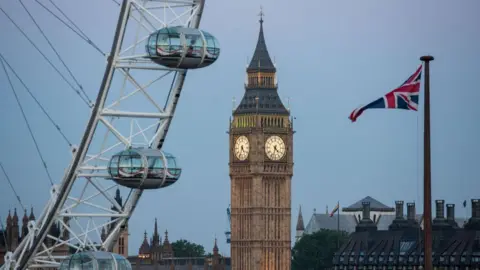ARTICLE AD BOX
2 hours ago
By Chas Geiger, BBC Politics • Jennifer Clarke, BBC News

 Getty Images
Getty Images
Winning a healthy share of votes in Thursday's election does not necessarily mean securing a similar proportion of seats in Parliament, smaller parties have complained.
Under the first-past-the-post system used in UK general elections, the person with the most votes in each constituency becomes the MP and candidates from other parties get nothing.
Reform UK, for example, are polling just a few points behind the Conservatives, but because their support is fairly evenly spread across a lot of constituencies it’s hard for them to convert those votes into seats.
Other smaller parties, including the Liberal Democrats and the Greens, also argue that the way MPs are chosen puts them at a disadvantage.
However, defenders of the first-past-the-post system say it produces stable governments.
What is first-past-the-post and how does it work?
The UK is divided into 650 areas, called constituencies, and each of these elects a single MP to represent its residents at Westminster.
Voters put a cross against the name of their preferred candidate on their ballot paper. The candidate with the most votes - or the "first past the post" - wins.
They do not need to get the majority of the votes cast in that constituency, only more than any other candidate.
In turn, the party with the most MPs wins the election.
If that party has more MPs than all the other parties put together - called a Commons majority - it forms the government. The party leader automatically becomes prime minister.
That is what happened at the last general election in 2019, when the Conservatives won 365 seats, giving the party a majority of 80, and Boris Johnson continued as PM.
In 2010, unusually, no party won a majority, so the Conservatives - who had the most MPs after the election - invited the Liberal Democrats to share power in a coalition government.
What have smaller parties said about first-past-the-post?
Since the beginning of the election campaign, opinion polls have suggested growing support for smaller parties.
Criticising the current voting system, Mr Farage said on Sunday that the party was likely to get fewer seats than the "number of votes should deserve." He added: "We're likely to see a Labour Party with not a particularly high share of the vote but a massive number of seats.”
Lib Dem leader Sir Ed Davey also wants a different voting system. Last week he told the BBC if that also meant seeing more Reform MPs “so be it”, as his party believed in “fair votes”.
Meanwhile, the Green Party of England and Wales are focusing their efforts on just four seats they see as winnable under the current system.
Smaller parties have long argued they are particularly disadvantaged under first-past-the-post which, they say, means millions of votes are not reflected in the make-up of the House of Commons.
For example, in 2019, the Lib Dems won 11.5% of the vote, but ended up with less than 2% of the seats in the Commons.
The Green Party of England and Wales got 2.7% of the vote, but that translated into just one MP.
In 2015, UKIP won 12.6% of the vote, but that returned only one MP.
What is the case for first-past-the-post?
The two largest parties - the Conservatives and Labour - both back first-past-the-post.
They argue the system is simple and well-understood by voters, and that it maintains a clear link between constituents and their MP.
Voters choose MPs, rather than parties, and can easily get rid of them if they want to at the next election, the case goes.
Because one party tends to form a majority under this system, supporters also say it gives the winner the chance to put its policy programme into action.
Other voting arrangements, they argue, often result in coalitions, meaning that horse trading between different parties happens behind closed doors, out of voters’ sight.
In a 2011 referendum, voters overwhelmingly backed keeping first-past-the-post for general elections by more than two to one.
How can first-past-the-post affect the way people vote?
Under the current system, most MPs are elected with a minority of the vote in their constituency, meaning that more people voted for rival candidates.
Opponents argue that this can put people off voting altogether because they think their vote will be wasted.
For example, they may feel there is no point voting for their preferred Conservative candidate if the current Labour candidate has a large majority which is unlikely to be overturned.
They may choose to vote tactically instead - backing the person they think has the best chance of defeating their least favourite candidate, rather than supporting their first choice.
Similarly, the party with the most MPs can form a government even if more people across the country voted for candidates from other parties.
The Conservative Party won a big majority in 2019 despite getting less than 44% of the popular vote.
In fact, no party has won more than 50% of the vote in a general election since 1945, but on most occasions either the Conservatives or Labour have had a majority of MPs and therefore formed a government.



 6 months ago
37
6 months ago
37








 English (US) ·
English (US) ·